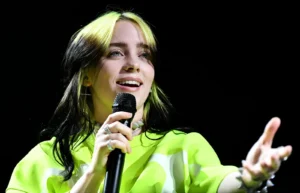Get ready to discover the musical magic behind the queen of the charts! Billie Eilish has captivated listeners with her unique sound and undeniable talent. But what genre is Billie Eilish? Search no more as we dive into the musical world of this rising star to uncover the genre that has made her a household name.
Billie Eilish is an American singer-songwriter who is best known for her unique style, which is a blend of various genres, including pop, alternative, and dark pop. Her music is characterized by hauntingly beautiful vocals, ethereal soundscapes, and melancholic lyrics.
She also incorporates elements of hip-hop and electronic music, making her music genre-defying and difficult to categorize into one specific genre. However, the term “Dark Pop” is often used to describe her music style.
Who is Billie Eilish, and what is her background?
Billie Eilish Pirate Baird O’Connell is an American singer-songwriter born on December 18, 2001. She was raised in Los Angeles and started her music career at a young age, writing and recording her first songs with her brother Finneas.
Her debut single, “Ocean Eyes,” went viral in 2015, and she quickly gained popularity for her unique sound and style. Eilish’s debut album “When We All Fall Asleep, Where Do We Go?” was released in 2019 and received widespread critical acclaim, earning her several Grammy Awards and solidifying her as one of the most promising artists of her generation.
She is known for her distinctive voice and moody, genre-blurring music, as well as her distinctive style and image.
What is the main genre of Billie Eilish’s music?
Billie Eilish’s music is difficult to categorize into one specific genre as it blends elements of various styles. However, her music is primarily classified as a type of pop music that incorporates elements of hip-hop, electronic, and alternative music.
This genre is often referred to as “Dark Pop.” Her music is known for its hauntingly beautiful vocals, ethereal soundscapes, and melancholic lyrics, creating a unique and captivating musical experience for listeners.
What makes Billie Eilish’s genre unique?
Billie Eilish’s genre is unique for several reasons:
- Blend of genres: Billie Eilish’s music incorporates elements from various genres, such as pop, hip-hop, electronic, and alternative music, creating a unique and genre-defying sound.
- Mood and style: Her music is characterized by hauntingly beautiful vocals, ethereal soundscapes, and melancholic lyrics, giving it a moody and atmospheric feel that sets it apart from other pop music.
- Image and attitude: Billie Eilish’s image and fashion sense are unconventional and often challenge traditional beauty standards in the music industry. This, combined with her confident and unapologetic attitude, gives her a unique persona that sets her apart from other artists in her genre.
- Collaboration with brother: Billie often collaborates with her brother Finneas on her music, which contributes to the unique sound and creative vision that sets her apart from other artists.
These elements make Billie Eilish’s music unique and contribute to her rising success as one of the most exciting and innovative artists in the industry.
How does Billie Eilish’s music fit into the current music scene?
Billie Eilish’s music fits into the current music scene as a standout and genre-defying presence. She has emerged as a leader in the current pop music landscape and is known for her unique sound that blends elements of hip-hop, electronic, and alternative music.
Her music appeals to a wide range of audiences, and her eclectic sound is in line with current trends in popular music. Additionally, her image and fashion sense, which challenge traditional beauty standards, align with current conversations around self-expression and body positivity in the industry.
Billie Eilish’s music and image also reflect a growing movement towards authenticity and individuality in the music scene. Overall, she is seen as a fresh and innovative voice in the current music landscape.
A complete list of Billie Eilish’s discography and genres
Here is a list of Billie Eilish’s complete discography and genres:
Albums:
- “When We All Fall Asleep, Where Do We Go?” (2019) – Dark Pop, Alternative, Electronic
EPs:
- “Don’t Smile at Me” (2017) – Dark Pop, Alternative
Singles:
- “Ocean Eyes” (2015) – Dark Pop, Alternative
- “Bury a Friend” (2019) – Dark Pop, Electronic
- “Bad Guy” (2019) – Dark Pop, Hip-Hop
- “Everything I Wanted” (2019) – Dark Pop, Alternative
- “Therefore I Am” (2020) – Dark Pop, Alternative
Note: The genres listed are based on the musical elements present in each of her releases and should be taken as a generalization. Her music often incorporates elements from various genres, making it difficult to categorize into one specific genre.
How has Billie Eilish’s genre evolved over time?
Billie Eilish’s genre has evolved over time as she has grown as an artist and expanded her musical style. She initially gained popularity with her hauntingly beautiful vocals, ethereal soundscapes, and melancholic lyrics, which led to her being classified as a type of “Dark Pop.”
However, as she has matured and continued to release new music, her genre has evolved to incorporate elements of hip-hop, electronic, and alternative music, making it increasingly difficult to categorize her music into one specific genre.
Her 2019 debut album “When We All Fall Asleep, Where Do We Go?” showcased a more eclectic and genre-defying sound, incorporating elements from various styles and solidifying her position as one of the most innovative and exciting artists in the industry. Since then, she has continued to push boundaries and evolve her sound, showcasing her versatility as a performer and songwriter.
Overall, Billie Eilish’s genre has evolved over time as she has matured as an artist and expanded her musical style, and her music continues to be genre-defying and challenging to categorize into one specific genre.
The most popular songs by Billie Eilish and their genre
Here is a list of some of Billie Eilish’s most popular songs and their genres:
- “Bad Guy” (2019) – Dark Pop, Hip-Hop
- “Ocean Eyes” (2015) – Dark Pop, Alternative
- “Bury a Friend” (2019) – Dark Pop, Electronic
- “When the Party’s Over” (2018) – Dark Pop, Alternative
- “Everything I Wanted” (2019) – Dark Pop, Alternative
- “Therefore I Am” (2020) – Dark Pop, Alternative
Note: The genres listed are based on the musical elements present in each song and should be taken as a generalization. Billie Eilish’s music often incorporates elements from various genres, making it difficult to categorize into one specific genre.
How has Billie Eilish’s genre influenced other musicians and the music industry?
Billie Eilish’s genre has had a significant impact on other musicians and the music industry by paving the way for more genre-defying and experimental sounds. Her unique blend of dark pop, hip-hop, electronic, and alternative elements in her music has inspired many other artists to push boundaries and experiment with their own sounds.
Her eclectic style and genre-defying approach have challenged traditional ideas of what pop music should sound like and have opened up new possibilities for artists to explore in their own music.
Additionally, Billie Eilish’s music has also contributed to the current trend of authenticity and individuality in popular music. Her music and image reflect a growing movement towards self-expression and rejecting traditional beauty standards, which has encouraged other artists to embrace their own unique styles and individuality.
Overall, Billie Eilish’s genre has had a lasting impact on the music industry by challenging traditional ideas and inspiring a new wave of genre-defying and innovative artists.
What are the defining characteristics of Billie Eilish’s genre?
The defining characteristics of Billie Eilish’s genre are a blend of dark pop, hip-hop, electronic, and alternative elements that create a unique and genre-defying sound.
- Dark Pop: Her music often features hauntingly beautiful vocals, ethereal soundscapes, and melancholic lyrics that give it a dark and brooding atmosphere.
- Hip-Hop: Billie Eilish incorporates elements of hip-hop into her music, such as her use of minimalist beats and bass-driven rhythms, as well as her incorporation of rap-style vocal delivery into her singing.
- Electronic: Her music features electronic elements such as synthesizers, electronic beats, and sound effects that contribute to the ethereal and futuristic soundscape in her music.
- Alternative: Her genre-defying approach and eclectic style also incorporate elements of alternative music, such as experimental sounds, unconventional song structures, and a rejection of traditional pop music norms.
Overall, these elements combine to create a unique and genre-defying sound that is characterized by its dark and brooding atmosphere, hip-hop beats, electronic soundscapes, and alternative elements.
How does Billie Eilish’s genre relate to other popular genres like pop, hip-hop, and rock?
Billie Eilish’s genre can be considered a blend of several popular genres, including pop, hip-hop, and rock.
- Pop: Her genre incorporates elements of pop music, such as her catchy melodies, radio-friendly hooks, and relatable lyrics.
- Hip-Hop: Billie Eilish incorporates elements of hip-hop into her music, such as her use of minimalist beats and bass-driven rhythms, as well as her incorporation of rap-style vocal delivery into her singing.
- Rock: Her genre also incorporates elements of rock, such as the moody and atmospheric soundscapes in her music, as well as the unconventional song structures and experimental sounds often found in alternative rock music.
Billie Eilish’s genre can be seen as a unique blend of these popular genres, which results in a genre-defying sound that is both innovative and appealing to a wide range of audiences.
Her unique approach to music has allowed her to stand out from other artists in the pop, hip-hop, and rock genres and has earned her critical acclaim and a dedicated fanbase.
What makes Billie Eilish’s genre appealing to listeners?
Billie Eilish’s genre appeals to listeners for several reasons, including:
- Unique Sound: Her unique blend of dark pop, hip-hop, electronic, and alternative elements creates a genre-defying sound that is fresh and appealing to listeners.
- Emotional Resonance: Her melancholic lyrics and hauntingly beautiful vocals often resonate with listeners on an emotional level, making her music relatable and cathartic.
- Authenticity: Billie Eilish is known for being genuine and authentic in her music and image, which appeals to listeners who value individuality and self-expression.
- Experimentation: Her genre-defying approach and willingness to experiment with new sounds and ideas keep her music exciting and innovative, appealing to listeners who enjoy more eclectic and unconventional music.
- Production Quality: The high production quality of her music, with its ethereal soundscapes, minimalist beats, and lush sound effects, adds to its appeal and creates a captivating listening experience.
Overall, Billie Eilish’s genre appeals to listeners due to its unique sound, emotional resonance, authenticity, experimentation, and production quality, making it a standout genre in the current music scene.
How has Billie Eilish’s genre been received by fans and critics?
Billie Eilish’s genre has been widely received with both critical and commercial success.
- Fans: Her fanbase has grown rapidly since her debut, and her fans are highly dedicated and passionate about her music. They appreciate the authenticity, emotion, and experimentation in her genre and often view her as an artist who is unafraid to push the boundaries of pop music.
- Critics: Critics have widely praised Billie Eilish’s genre, with many calling it innovative, genre-defying, and emotionally resonant. Her unique blend of dark pop, hip-hop, electronic, and alternative elements, as well as her authenticity and emotional lyrics, have earned her critical acclaim.
Overall, Billie Eilish’s genre has been well-received by both fans and critics, and she has become one of the most talked-about and influential artists in the current music scene. Her unique sound and approach to music have earned her numerous accolades, including several Grammy Awards, and solidified her place as a leading voice in popular music.
Recommended:
- How to use copyrighted music on Facebook legally
- How to listen to music without wifi
- What are the best song quotes?
What are some of the challenges and limitations of Billie Eilish’s genre?
Despite its success and popularity, Billie Eilish’s genre also has its challenges and limitations, including:
- Narrow Appeal: While her genre has a dedicated and passionate fanbase, it may not appeal to all listeners and may come across as too niche or experimental for some.
- Limited Crossover Potential: Her genre-defying sound may not be easily adapted to other genres, which may limit her crossover potential with other audiences.
- Saturation: With many artists attempting to emulate Billie Eilish’s sound and style, the genre may become oversaturated, making it more difficult for her to stand out from the crowd.
- Staying Relevant: Billie Eilish will need to continually evolve and innovate in order to keep her genre fresh and relevant, as well as to avoid being perceived as a one-hit-wonder.
Overall, while Billie Eilish’s genre has been widely successful, it does face challenges and limitations in terms of its narrow appeal, limited crossover potential, saturation, and the need to remain relevant in the changing music scene.
Conclusion
This page gives all you need to know about what genre is billie eilish. Billie Eilish’s genre is a unique blend of dark pop, hip-hop, electronic, and alternative elements, characterized by its hauntingly beautiful vocals, emotional lyrics, genre-defying sound, and high production quality.
Her genre has earned her both critical and commercial success, with a dedicated and passionate fanbase, but she also faces challenges and limitations in terms of its narrow appeal, limited crossover potential, and need for constant innovation.




